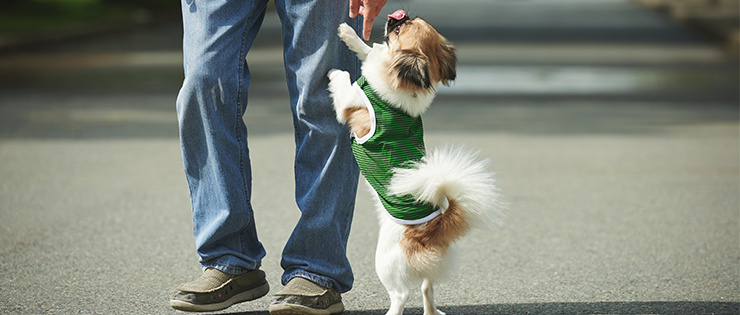
Jumping up is arguably the most common behaviour problem for dogs and is certainly one that drives us barking mad. The pushing, the tearing of our skin, the knocking over and just the outright annoyance, jumping up is a behaviour that only gets worse, and generally never disappears unless it is managed consistently.
So, why do dogs jump up? Well, have you ever felt so excited or anxious about something that you struggled to control your impulses? What if every time you expressed how you felt, it was reinforced? This is exactly what is going on in the minds of our best furry friends. A lack of impulse control coupled by a reward, means that this behaviour may indeed become so ingrained in your dog’s mind, that it lasts a lifetime.
Understanding dog behaviour is fairly straight forward. Behaviours occur because they are reinforced. What this means is that if your dog experiences something very positive whilst behaving that way, they learn to make the association. ‘If I do A, then I get B’. In the world of psychology, we call this Operant Conditioning. Operant conditioning is based on recognising that a behaviour is instrumental to a consequence; a sort of Cause and Effect’. We don’t tend to do things if we have had a bad experience doing them before, or if it wasn’t worthwhile, or if there is something more worthwhile doing instead. For dogs who jump up, clearly there is a motivation to do so. What we need to understand is how to teach them to not just control their impulses but show them that there is a much better way to express their emotional state.
Ideally, this training begins in puppy-hood. Blank canvases are much easier to teach because they don’t have a preconceived idea on how to get what they want. However, it is easy to curb this behaviour with dogs of all ages by following my approach below:
Find out WHY they are doing it
The reinforcer can be as simple as you talking to them, but there are a range of reasons why your dog jumps up. Some reasons that spring to mind are:
- Food appeared
- They got attention
- They were releasing pent up energy
- They were nervous and trying to communicate with you
Make the commitment to be consistent
Even if your dog is not rewarded 99 out of 100 times, they will continue to offer the behaviour. Any time your dog jumps up, it is imperative you consistently turn around and walk away. Ostracising them is exactly what they don’t want, so moving away and ignoring them for 10 seconds will make them think again.
Decide on a behaviour you prefer and reinforce it
Usually the best behaviour is having four feet on the floor. Whether they are standing or sitting doesn’t really matter. Every time your dog appears mildly excited, reward them with food and praise and introduce a word for them to associate with NOT jumping. The word you choose needs to be consistently voiced whenever your dog’s four feet are on the floor. When this occurs, ensure you immediately reward them for it.
Soon, the word you choose will have meaning and your dog will start to realise when they are standing or sitting, there is an excellent chance they will get what they want from you. At this point, your dog is learning to cooperate.
There is a strategy I use for all dogs no matter what behaviour issue, which is called the 3Cs. There are three behaviours I want all dogs to learn and they all start with the letter C.
- Calm
- Cooperative
- Controlled
Whenever your dog displays any or all of these, they should be rewarded with what they want. The 3Cs is great for curbing jumping behaviours because it is a foundation for teaching dogs to proactively think for themselves. The art to this training is not to ask your dog to cooperate for example, but to provide an environment in which they will cooperate, where you are in a position to reinforce their own positive choice. One of the things we don’t do enough of is empower dogs and encourage them to make their own positive choices.
So, if there is just one take home message here, it is to be consistent. Dogs are creatures of habit, but they are also manipulative. If they think a behaviour will result in what they want, then they will continue to do it. Be patient with your dog also. Remember, they are just doing what they think will work. If it takes a little longer than expected, don’t despair. Keep at it, be consistent and ensure you are always in a positive to reinforce the good behaviour. The more you reinforce the good, the more you will see your dog behaving that way.